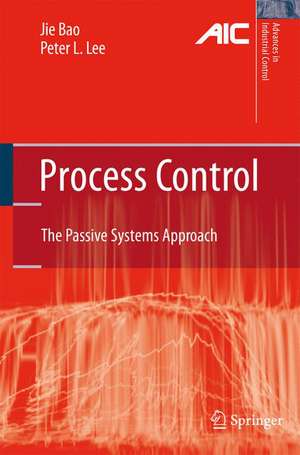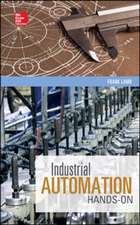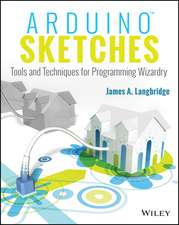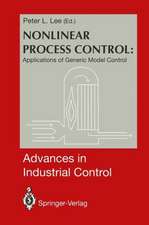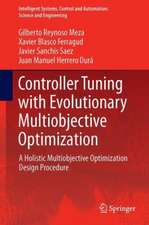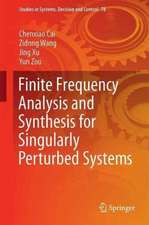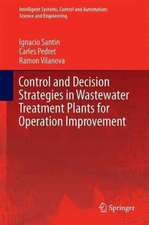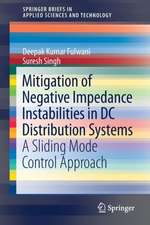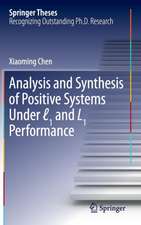Process Control: The Passive Systems Approach: Advances in Industrial Control
Autor Jie Bao, Peter L. Leeen Limba Engleză Hardback – 26 iun 2007
In this book, passivity-based developments in the areas of robust process control, decentralized control, fault tolerant control, process controllability analysis and nonlinear process control are addressed systematically for the first time. Written for the industrial, engineering and academic communities, the emphasis is placed on results that enhance insight and intuition. Application issues are illustrated by case studies in all the main chapters. MATLAB® routines for all examples and a library of functions that implement the methods developed in "Process Control" can be downloaded from springer.com.
| Toate formatele și edițiile | Preț | Express |
|---|---|---|
| Paperback (1) | 943.57 lei 6-8 săpt. | |
| SPRINGER LONDON – 21 oct 2010 | 943.57 lei 6-8 săpt. | |
| Hardback (1) | 1112.60 lei 6-8 săpt. | |
| SPRINGER LONDON – 26 iun 2007 | 1112.60 lei 6-8 săpt. |
Din seria Advances in Industrial Control
- 15%
 Preț: 643.34 lei
Preț: 643.34 lei - 23%
 Preț: 582.63 lei
Preț: 582.63 lei - 18%
 Preț: 783.98 lei
Preț: 783.98 lei - 18%
 Preț: 947.35 lei
Preț: 947.35 lei - 20%
 Preț: 568.24 lei
Preț: 568.24 lei - 15%
 Preț: 643.16 lei
Preț: 643.16 lei - 18%
 Preț: 899.21 lei
Preț: 899.21 lei - 18%
 Preț: 891.33 lei
Preț: 891.33 lei - 18%
 Preț: 740.57 lei
Preț: 740.57 lei - 18%
 Preț: 961.23 lei
Preț: 961.23 lei - 18%
 Preț: 955.08 lei
Preț: 955.08 lei - 15%
 Preț: 645.28 lei
Preț: 645.28 lei - 15%
 Preț: 638.43 lei
Preț: 638.43 lei - 18%
 Preț: 901.11 lei
Preț: 901.11 lei - 18%
 Preț: 1410.94 lei
Preț: 1410.94 lei - 18%
 Preț: 728.91 lei
Preț: 728.91 lei - 20%
 Preț: 1003.77 lei
Preț: 1003.77 lei - 18%
 Preț: 947.35 lei
Preț: 947.35 lei - 15%
 Preț: 643.34 lei
Preț: 643.34 lei - 15%
 Preț: 654.30 lei
Preț: 654.30 lei - 18%
 Preț: 950.52 lei
Preț: 950.52 lei - 15%
 Preț: 644.30 lei
Preț: 644.30 lei - 18%
 Preț: 1393.09 lei
Preț: 1393.09 lei - 18%
 Preț: 950.21 lei
Preț: 950.21 lei - 18%
 Preț: 949.90 lei
Preț: 949.90 lei - 18%
 Preț: 949.42 lei
Preț: 949.42 lei - 18%
 Preț: 950.52 lei
Preț: 950.52 lei - 18%
 Preț: 1113.71 lei
Preț: 1113.71 lei - 15%
 Preț: 650.04 lei
Preț: 650.04 lei - 15%
 Preț: 644.95 lei
Preț: 644.95 lei - 18%
 Preț: 950.33 lei
Preț: 950.33 lei - 18%
 Preț: 948.61 lei
Preț: 948.61 lei - 15%
 Preț: 644.63 lei
Preț: 644.63 lei - 18%
 Preț: 953.20 lei
Preț: 953.20 lei - 18%
 Preț: 945.62 lei
Preț: 945.62 lei - 15%
 Preț: 640.88 lei
Preț: 640.88 lei - 15%
 Preț: 640.88 lei
Preț: 640.88 lei - 20%
 Preț: 650.92 lei
Preț: 650.92 lei - 18%
 Preț: 1112.60 lei
Preț: 1112.60 lei - 20%
 Preț: 998.36 lei
Preț: 998.36 lei - 15%
 Preț: 643.34 lei
Preț: 643.34 lei - 18%
 Preț: 948.92 lei
Preț: 948.92 lei - 18%
 Preț: 1381.43 lei
Preț: 1381.43 lei - 15%
 Preț: 651.51 lei
Preț: 651.51 lei - 15%
 Preț: 647.08 lei
Preț: 647.08 lei - 20%
 Preț: 563.66 lei
Preț: 563.66 lei - 18%
 Preț: 998.03 lei
Preț: 998.03 lei - 18%
 Preț: 1225.79 lei
Preț: 1225.79 lei
Preț: 1112.60 lei
Preț vechi: 1356.83 lei
-18% Nou
Puncte Express: 1669
Preț estimativ în valută:
212.92€ • 220.94$ • 177.96£
212.92€ • 220.94$ • 177.96£
Carte tipărită la comandă
Livrare economică 18 martie-01 aprilie
Preluare comenzi: 021 569.72.76
Specificații
ISBN-13: 9781846288920
ISBN-10: 1846288924
Pagini: 276
Ilustrații: XX, 253 p. 77 illus.
Dimensiuni: 155 x 235 x 27 mm
Greutate: 0.55 kg
Ediția:2007
Editura: SPRINGER LONDON
Colecția Springer
Seria Advances in Industrial Control
Locul publicării:London, United Kingdom
ISBN-10: 1846288924
Pagini: 276
Ilustrații: XX, 253 p. 77 illus.
Dimensiuni: 155 x 235 x 27 mm
Greutate: 0.55 kg
Ediția:2007
Editura: SPRINGER LONDON
Colecția Springer
Seria Advances in Industrial Control
Locul publicării:London, United Kingdom
Public țintă
ResearchCuprins
Dissipativity and Passivity.- Passivity-based Robust Control.- Passivity-based Decentralized Control.- Passivity-based Fault-tolerant Control.- Process Controllability Analysis Based on Passivity.- Process Control Based on Physically Inherent Passivity.
Recenzii
From the reviews:
“Process Control: The Passive Systems Approach provides material that is potentially valuable to students and researchers interested in learning the fundamentals of passivity-based methods and their application to chemical process control and thermodynamics. … The main strength of the book is that it shows that passivity can provide a formalism for studying process control. Relevant results are reviewed, and interesting research questions are posed. … Overall, the book is useful as a reference and as a source of new research ideas.” (B. Erik Ydstie, IEEE Control Systems Magazine, Vol. 30, February, 2010)
“Process Control: The Passive Systems Approach provides material that is potentially valuable to students and researchers interested in learning the fundamentals of passivity-based methods and their application to chemical process control and thermodynamics. … The main strength of the book is that it shows that passivity can provide a formalism for studying process control. Relevant results are reviewed, and interesting research questions are posed. … Overall, the book is useful as a reference and as a source of new research ideas.” (B. Erik Ydstie, IEEE Control Systems Magazine, Vol. 30, February, 2010)
Notă biografică
Jie Bao holds the position of Senior Lecturer; he has industrial experience in China with the Control and Measurement Division of ZUSTD Corp. He is a reviewer for several journals including: Journal of Process Control, Journal of Membrane Science, IEEE Automatic Control and ASME Journal of Dynamic Systems, Measurement and Control. In the last seven years, he has published 16 papers in archival journals.
Peter Lee is currently the Executive Dean of Engineering, Science and Computing at Curtin University of Technology. Previously he held senior positions at Murdoch University and the University of Queensland. He also worked with ICI Australia for a number of years. He has worked in Process Control for the last 25 years, both in academe and industry. An author of 3 books and over 220 papers, he also has an active consultancy practice in the feasibility, development and application of process control methods. He is also a consultant to the United Nations Industry Development Organisation. He was awarded the Shedden Pacific Medal for Excellence for contributions to Chemical Engineering in 1993, The Institution of Engineers Australia Excellence Award in 1998 for the design of laboratory facilities at Rockingham and the Centenary Medal for services to Australian society in 2003. Peter was educated in Melbourne and has degrees from RMIT (BE) and Monash University (PhD). He is a Fellow of the Institution of Engineers Australia and a Fellow of the Institution of Chemical Engineers, London.
Peter Lee is the editor of the 1993 Springer title: Lee (ed.), Nonlinear Process Control (3-540-19856-3, 1993, 264 pp HC)
Peter Lee is currently the Executive Dean of Engineering, Science and Computing at Curtin University of Technology. Previously he held senior positions at Murdoch University and the University of Queensland. He also worked with ICI Australia for a number of years. He has worked in Process Control for the last 25 years, both in academe and industry. An author of 3 books and over 220 papers, he also has an active consultancy practice in the feasibility, development and application of process control methods. He is also a consultant to the United Nations Industry Development Organisation. He was awarded the Shedden Pacific Medal for Excellence for contributions to Chemical Engineering in 1993, The Institution of Engineers Australia Excellence Award in 1998 for the design of laboratory facilities at Rockingham and the Centenary Medal for services to Australian society in 2003. Peter was educated in Melbourne and has degrees from RMIT (BE) and Monash University (PhD). He is a Fellow of the Institution of Engineers Australia and a Fellow of the Institution of Chemical Engineers, London.
Peter Lee is the editor of the 1993 Springer title: Lee (ed.), Nonlinear Process Control (3-540-19856-3, 1993, 264 pp HC)
Textul de pe ultima copertă
Process Control introduces an emerging area in process control – control system analysis and design based on the concept of passive systems. Passive systems are a class of processes that dissipate certain types of physical or virtual energy, defined by Lyapunov-like functions. Passivity and associated stability conditions form one of the cornerstones in control theory and have recently begun to be applied in process control. Defined as an input-output property, the concept of passivity implies stability conditions for interconnected systems. Passive systems are minimum phase and thus very easy to control via output feedback, even if they are highly nonlinear and coupled. Therefore, the passivity framework can be used in process input-output controllability analysis as well as control design. Here, the concept of passive systems is also linked to process thermodynamics to provide process engineers with insights into the physical bases of the above results.
In this book, passivity-based developments in the areas of robust process control, decentralized control, fault tolerant control, process controllability analysis and nonlinear process control are addressed systematically for the first time. Written for the industrial, engineering and academic communities, the emphasis is placed on results that enhance insight and intuition. Application issues are illustrated by case studies in all the main chapters. MATLAB® routines for selected examples and a library of functions that implement the system analysis and control design methods developed in Process Control can be downloaded from springer.com. This book presents the reader with both the conceptual framework and practical tools for passivity-based system analysis and control.
In this book, passivity-based developments in the areas of robust process control, decentralized control, fault tolerant control, process controllability analysis and nonlinear process control are addressed systematically for the first time. Written for the industrial, engineering and academic communities, the emphasis is placed on results that enhance insight and intuition. Application issues are illustrated by case studies in all the main chapters. MATLAB® routines for selected examples and a library of functions that implement the system analysis and control design methods developed in Process Control can be downloaded from springer.com. This book presents the reader with both the conceptual framework and practical tools for passivity-based system analysis and control.
Caracteristici
The first systematic presentation of the process-engineering applications for the key theoretical area of passivity-based control Downloadable MATLAB® routines for all the examples and a library of functions to implement the analysis and design methods discussed Includes supplementary material: sn.pub/extras
